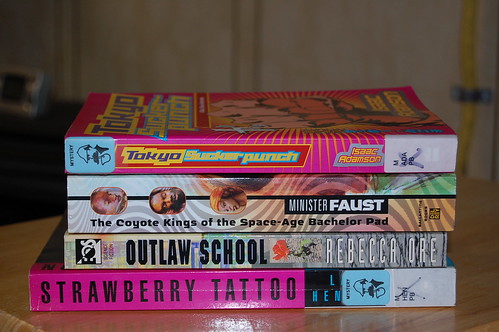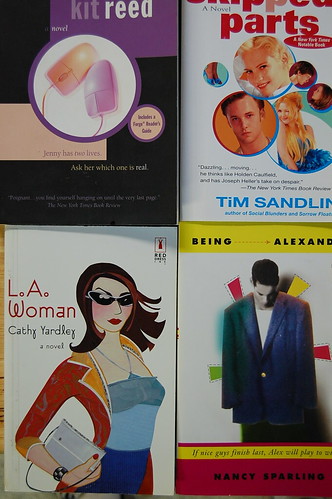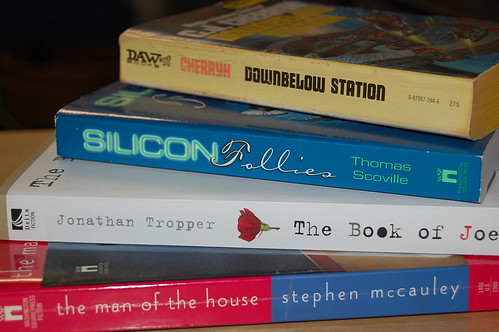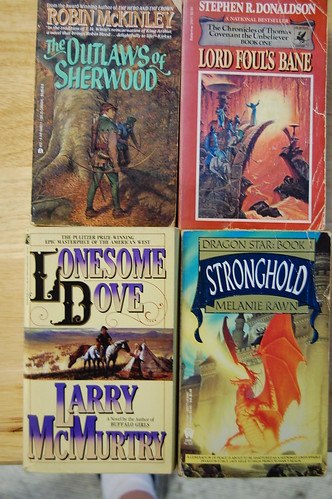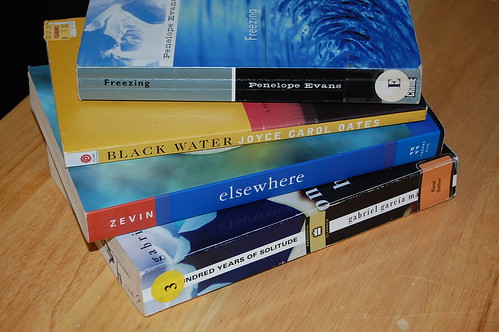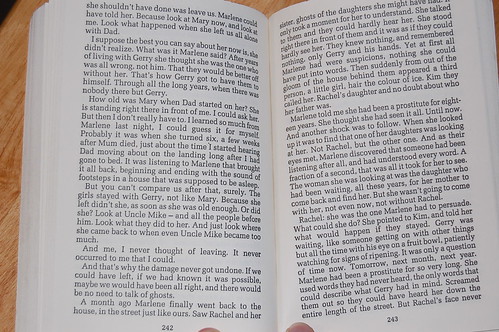Strawberry Tattoo – Lauren Henderson (1999)
This one has an interesting cover, but the language and description on the first few pages seems forced and not very engaging. The first two pages are taken up with a dream sequence and nothing really seems to happen. No hint of conflict (other than vague assertions that the character did something “very bad” due to a alcohol/chemical induced blackout). This provides no real hint of who the narrator is or what she wants. It also claims to be a mystery on the inside cover flap. If it is, it starts way too slow for a mystery and there is no evidence of a crime at all within the first five pages. There is nothing here that makes me want to keep on reading. I'm eliminating this one.
Outlaw School – Rebecca Ore (2000)
On the first page of this book we encounter the protagonist, Jane’s, first memory; a memory of absolute terror. Through this scene you get an indication of how bad of a mother she has and one of the obstacles that Jane will have to overcome even before she faces the Orwellian society outside of her family. Jane possesses great intelligence, and this doesn't fit within the society of this book. The first five pages presents a world where people are tightly controlled by the class into which they are born in, not by intelligence or abilities. An interesting world sketched within the first five pages that I want to read more about. This one goes on to round two.
The Coyote Kings of the Space Age Bachelor Pad – Minister Faust (2004)
First of all, an intriguing title earns a +1 bonus. The character (narrator) is an honors English major (another +1 for an English major character… English majors always get a bad rap). An epilogue at the very beginning of the book? Unusual, but this supports the style established by the unique book title and cover design. The narrative voice is interesting and engaging (+1). Character information is presented in a role-playing game-like sheet (I love when authors find clever ways of presenting or introducing characters in such a way that does not seem forced +1). Pop culture references to Star Wars, Star Trek and comic books within the first five pages and on the back cover, not only helps establish the writing style, but all appeal to the geek in me (+3… one for each geek reference). With the arbitrary +7 score, this one’s a no brainer and going to the next round.
Tokyo Sucker Punch – Isaac Adamson (2000)
This book has a protagonist from Cleveland which is a big plus. (I’ll even give this an arbitrary +1 score for that.) Cleveland, like English majors, always gets a bad rap… I mean when was the last time you saw Cleveland mentioned in the national media without a joke attached to it? Having grown up in the Cleveland area (even though I don’t live there now) I still get offended by this… Anyway, I digress…
The back cover copy suggests an interesting combination part noir detective novel and part Chinese martial arts film. The first five pages have plenty of action, including the geisha in distress and a fight between the protagonist and Yakuza. It is sort of interesting, but not that engaging to me. I can't put my finger on what I don’t like about it. The author isn’t from the Cleveland area though so this might end up being a sly dig on Cleveland (the butt of the joke again), but the Adamson does not come across this way (yet) Maybe I need a few more pages to make a definitive decision, but there are many good books in this round and the arbitrary +1 score might not be enough to save it from elimination this round. It is a maybe for now, but definitely leaning heavily towards elimination.
Books Eliminated So Far (and available if you want them):
- 21 – Jeremy Iversen (2005)
- Farm Fatale – Wendy Holden (2001)
- Freezing -- Penelope Evans (1997)
- Stronghold: Dragonstar Book 1 – Melanie Rawn (1990)
- Man of the House – Stephen McCauley (1996)
- Strawberry Tattoo -- Lauren Henderson (1999)
- Lord of Chaos (Wheel of Time Book 6) – Robert Jordan (1995)
- Crown of Swords (Wheel of Time Book 7) – Robert Jordan (1997)
